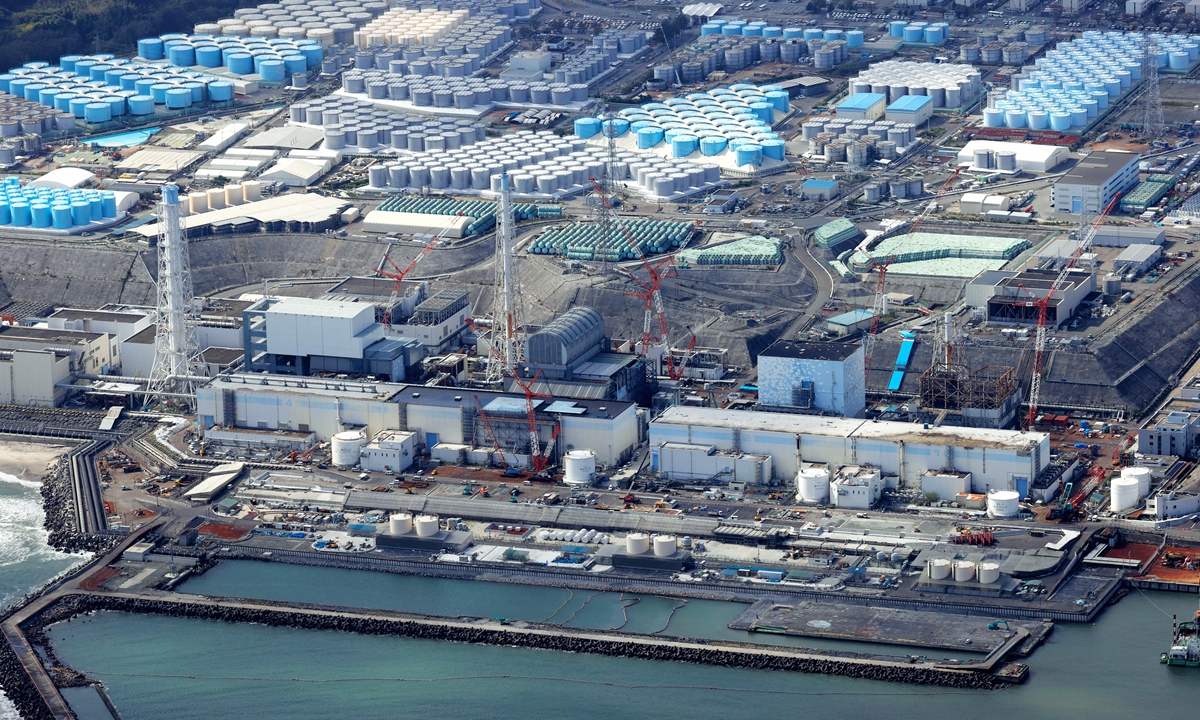
A file photo shows containers of nuclear-contaminated water at the Fukushima nuclear plant in Japan on October 16, 2020. Japan's nuclear regulator on July 22, 2022 approved the dumping of the water into the sea, despite international concerns and protests. Photo: VCG
About 10 days after Japan's nuclear regulator approved the plan to discharge nuclear-contaminated water from the Fukushima power plant, another nuclear power plant in central Japan leaked about seven tons of water containing radioactive elements, sparking wide concern over safety of Japan's nuclear power plants.
Also, on Tuesday the local government in Fukushima Prefecture agreed to allow Tokyo Electric Power Company (TEPCO) to build facilities to dump the nuclear-contaminated water, Japan's NHK reported. The Nuclear Regulation Authority of Japan on July 22 officially approved the water discharge plan.
According to the operator Kansai Electric Power Company, about seven tons of radioactive water leaked from Mihama 3 reactor at the Mihama nuclear power plant in Fukui Prefecture on Monday. The amount of radioactivity of the leaked water is about 2.2 million becquerels (Bq).
According to the Waste Management and Recycling Department, Japanese Ministry of the Environment, 100Bq/kg is the standard for safe recycling of waste and 8,000Bq/kg is the standard for safe disposal of waste.
The company claimed that the leak was contained and had no impact on the external environment.
The over 40-year-old reactor is currently out of service. The company is investigating whether the leak will affect the reactor's scheduled restart in mid-August, Japanese media outlet Sankei News reported.
The aging Mihama 3 reactor has a stained history. In August 2004, a pipeline of the reactor broke down, which killed five and seriously injured six people, according to the Yomiuri Shimbun.
Voices from civil society have expressed their deep concern over the Mihama nuclear power plant.
According to Kyoto Shimbun, a civil group on Friday urged the governor of Shiga Prefecture to publicly announce their opposition to the Kansai Electric Power Company's plan to restart Mihama 3 in mid-August.
The latest radioactive water leak and the dumping of Fukushima nuclear waste have largely overdrawn the credit of the Japanese authorities and related companies, according to both netizens from Japan and China.
A Japanese netizen said the old Mihama reactor has long been in bad condition. Another Japanese netizen said the accident could be intentional.
"The leak will not affect the outside environment. Really? Japan said the same thing when they decided to dump the Fukushima nuclear-contaminated water into the sea!" said a Chinese netizen.
Zhang Yancang, director of the Yellow Sea and Bohai Sea Research Institute of Dalian Maritime University, told the Global Times on Tuesday that the ocean is not Japan's sewage disposal site, and the marine ecology is an organic whole, so once the pollution spreads, it may affect the entire body. Most countries, including the US, cannot be immune to it.
According to the United Nations Convention on the Law of the Sea, states should hold an international legal obligation to combat transboundary pollution of the oceans. However, Japan has prepared for a long time to avoid legal responsibility for dumping nuclear-contaminated water and radioactive water leaks, Zhang said.
Also, according to Kyodo News, Tokyo Electric Power Company said on Wednesday that it will on Thursday start to build undersea tunnels and other facilities to discharge treated water from the Fukushima nuclear plant into the ocean.
The Chinese Foreign Ministry on Wednesday reiterated its strong concern and opposition on the one-sided decision made by the Japanese government on releasing nuclear-contaminated water from the Fukushima nuclear power plant into the sea as the construction of dumping facilities are reported to begin on Thursday.
The Japanese government decided to discharge nuclear-contaminated water from the Fukushima nuclear power plant into the sea in April 2021. The plan got formal approval from Japan's nuclear regulator on July 22 and is expected to start in spring 2023.




